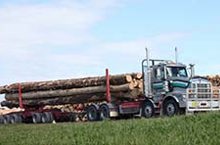
Hydrogen, electric and dual-fuel are all future fuels solutions that are going to work for the entire heavy transport industry. Those involved in wood transport are right at the forefront of this conversion.
While soaring fuel prices and greener policies have given electric vehicles (EVs) a serious boost in recent years, now the attention is turning to trucks, but manufacturers still face a dilemma over which technology can best do the job. Some companies are embracing battery-electric trucks because they’re cheaper and the charging infrastructure is more developed.
Others are betting on hydrogen-powered fuel cells because they can support longer ranges, heavier payloads and longer uptime via faster refuelling. For some, the solution’s likely to be somewhere in the middle. Electric trucks have recently been launched where their normal range can be doubled or tripled using hydrogen as a backup energy source.
As well as electric conversions from diesel powered log trucks, hydrogen powered trucks, including log and timber haulage trucks have already been brought into New Zealand - the first nationwide hydrogen refuelling networks are being rolled out, dual-fuel hydrogen technologies have been trialled since late 2021 with one large trucking fleet involved in log transport planning to have ten of these dual-fuel hydrogen diesel trucks on the road by the second quarter of 2023.
The technologies, the results and the lessons from these early conversions are going to be profiled in the first Wood Transport & Logistics event run for over five years, in Rotorua, New Zealand on 24-25 May 2023.
The previous week is Road Safety Week (15 – 21 May) where companies are being encouraged to join hundreds of communities, schools and organisations running activities to raise awareness of road safety issues.
Road Safety Week is coordinated by Brake, the road safety charity and sponsored by Waka Kotahi NZ Transport Agency and Beca. This year the week has the theme Road Safety Heroes, recognising all those who are working to make our roads safer for everyone – from designing safer roads to caring for people after a crash. The theme will also highlight the part everyone who uses roads can play in making them safer.
It runs concurrently with UN Global Road Safety Week, which has a focus on sustainable mobility. Activities on sustainable and active travel will be incorporated into the Road Safety Heroes theme too.
Brake is encouraging organisations to go to www.roadsafetyweek.org.nz/organisations for ideas on taking part, and to sign up for a free electronic action pack to help them raise awareness and promote safer road use to staff, contractors, customers and the wider community. This will include downloadable resources and activity ideas, advice, and case studies from previous years.
Brake’s NZ Director, Caroline Perry, says: “We believe it’s everyone’s human right to be able to get around in a safe and healthy way every day. There are lots of people who work to make our roads safer, to save lives when crashes happen, and to support those affected by crashes, so this Road Safety Week we want to recognise all these Road Safety Heroes and highlight how everyone can be a hero too.
“Employers can really take the lead on safe and healthy journeys and help get these vital messages out to drivers, families and the wider community, making a big difference to their local area.”
Organisations with staff who drive for work are also urged to make use of guidance from the Global Fleet Champions campaign in the run up to the Week to develop year-round fleet safety practices. Becoming a member is FREE, and provides access to a range of fleet safety resources, events and news. Visit www.globalfleetchampions.org to sign up.









